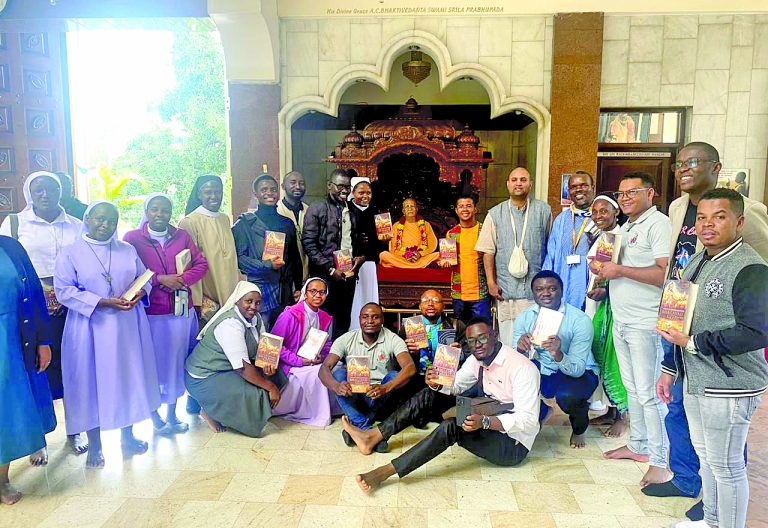Young Hare Krishna monks revive simple way of living
By Francis Githinji, June 4, 2025We are living, some might say surviving, in an age where our minds are louder than our hearts.
We scroll more than we sleep and multitask rather than meditate. In this way, we confuse activity with purpose and motion with progress.
Yet, as we remain tethered to our screens, rushing from one obligation to another, anxiety has become the ambient noise beneath our polished exterior, leaving multitudes silently battling burnout, distraction, and the loss of inner peace.
But it wasn’t always like this. There was a time when life was simple, sacred, and community-driven, deeply rooted in nature and spiritual values. In those days, people’s lives were woven with a rich inner experience.
A group of young monks in their twenties is trying to revive this lifestyle with the help of the ISKCON (International Society for Krishna Consciousness) Temple in Nairobi.
These young men and women have tapped into the ‘Vaishnava’ monk lifestyle.
According to the young monks, their goal is self-realisation through devotion and meditation on God’s name, form, activities, and philosophy, called Bhakti Yoga in Sanskrit, as propounded by Vedic literature.
These include the four ‘Vedas’ (Books of knowledge), 18 ‘Puranas’ (old mythological texts), 108 ‘Upanishads’ (Philosophical texts), and two ‘Itihasas’ (Historical books), as well as the ‘Mahabharata’ and ‘Ramayana’, which are the most common.
I met them at their centre in Juja. Across Kenya, they have centres in Nairobi, Nakuru, Mombasa, Kisumu, and Juja.
The young monks are fully adorned in ‘Tilaka’, the white marking on the forehead that distinguishes them from other ‘Vaishnava’ sects, Kurta, a loose collarless shirt, and Dhoti, an ankle-length breechcloth wrapped around the waist and leg, resembling trousers.
They also carry bead bags with 108 beads for chanting.
This is the most important aspect of their lifestyle, as they believe that calling the names of God is the religion, or yoga, of this age.
Most are clean-shaven except for some with a Sikha, the tuft of hair at the dermal papilla, where hair begins growing.
The Sikha symbolises devotion, discipline, and spiritual focus.
Key principles
When a person dies, which to them would be when the soul leaves the body, it will be from any opening if it is going to remain on the material plane.
However, if the soul leaves through that part, it is elevated to the spiritual realm.
They wear white and saffron-coloured dhotis for married people and renunciates (celibate monks), respectively.
The monks observe four regulative principles, including no meat eating as a means of exercising nonviolence, avoidance of illicit sex, which is any sexual activity not meant for childbearing, no intoxication because inebriating substances weaken the control of the senses, and no gambling or mental speculation as it promotes greed, deceit, and a desire for quick gain.
Apart from animism and shamanic traditions practised by prehistoric humans, Vaishnavism is the oldest continuously practised and scripture-based religion based on contemporary knowledge.
If Christians are people of the Book, then ‘Vaishnavas’ are people of the library, going by the hefty volumes of books they read, written over the thousands of years it has existed.
All in Sanskrit, the oldest language still used today.
Vegetarianism, for them, isn’t simply about fostering nonviolence.
It is to live according to the dictates of Krsna, who to them is the Absolute Truth used interchangeably with the Supreme Personality of Godhead.
Their day begins at 4 am when they wake up and shower. At 5 am, they report to the temple for the morning programme, which includes singing, dancing, chanting on beads, and a class on the ‘Srimad Bhagavatam’, the chief Purana, lasting until breakfast at 9 am.
After breakfast, they are free to go about their normal business. Then there is lunch.
They resume their normal duties until 7 pm, when they attend a ‘Bhagavad Gita’ class and then take supper, after which they retire for the night.
They also have a food for life programme, where they distribute food to needy members of society daily.
All that is to attain self-realisation, which is experiencing life minus the pangs of material nature.
As the noise, speed, and distractions in the world continue mounting to the detriment of people’s physical, mental, and spiritual health, the experience of these Vaishnava monks offers a radically quiet alternative filled with purpose, purity, and profound inner peace.
By rising before dawn, chanting, living simply, thinking highly, and serving others, the monks step away from material distractions to walk a path shaped by devotion and detachment.
Their chosen way of life, they say, is not to escape reality but to align with timeless truths.
